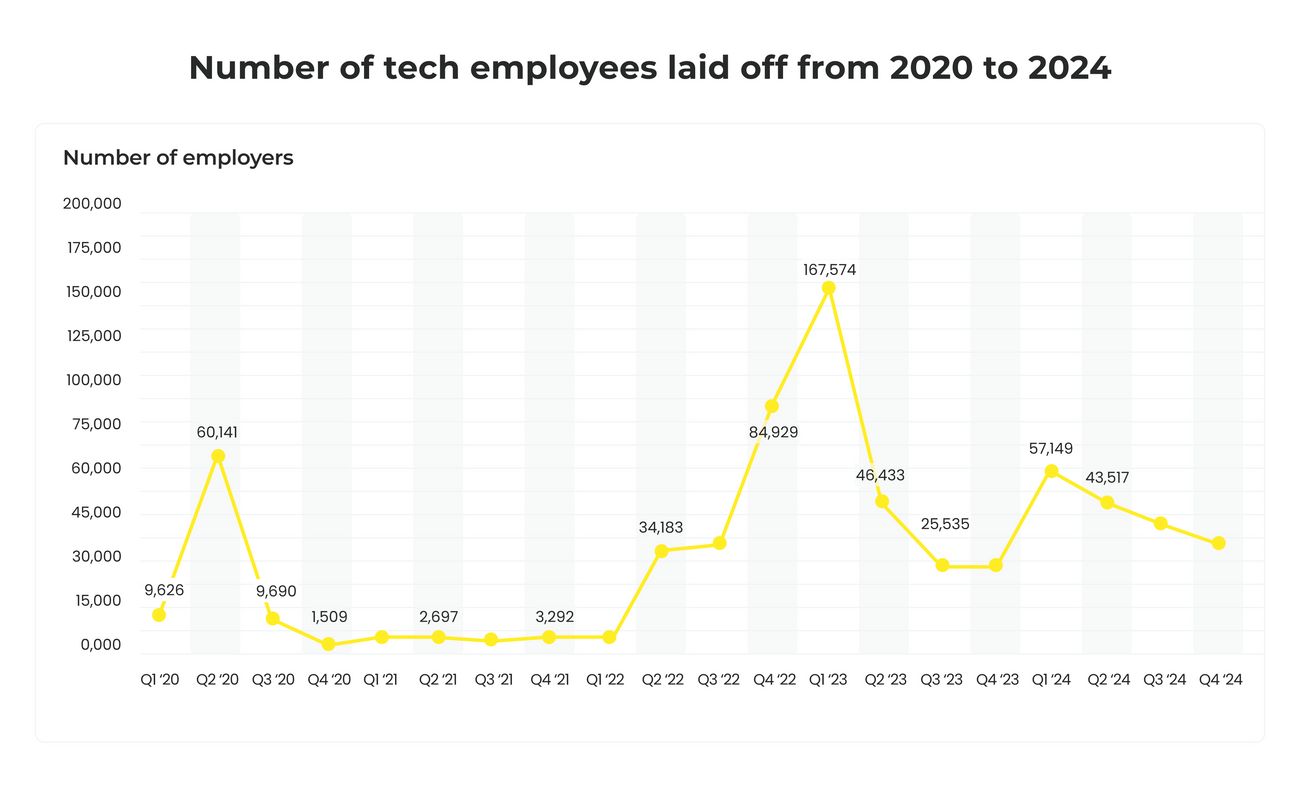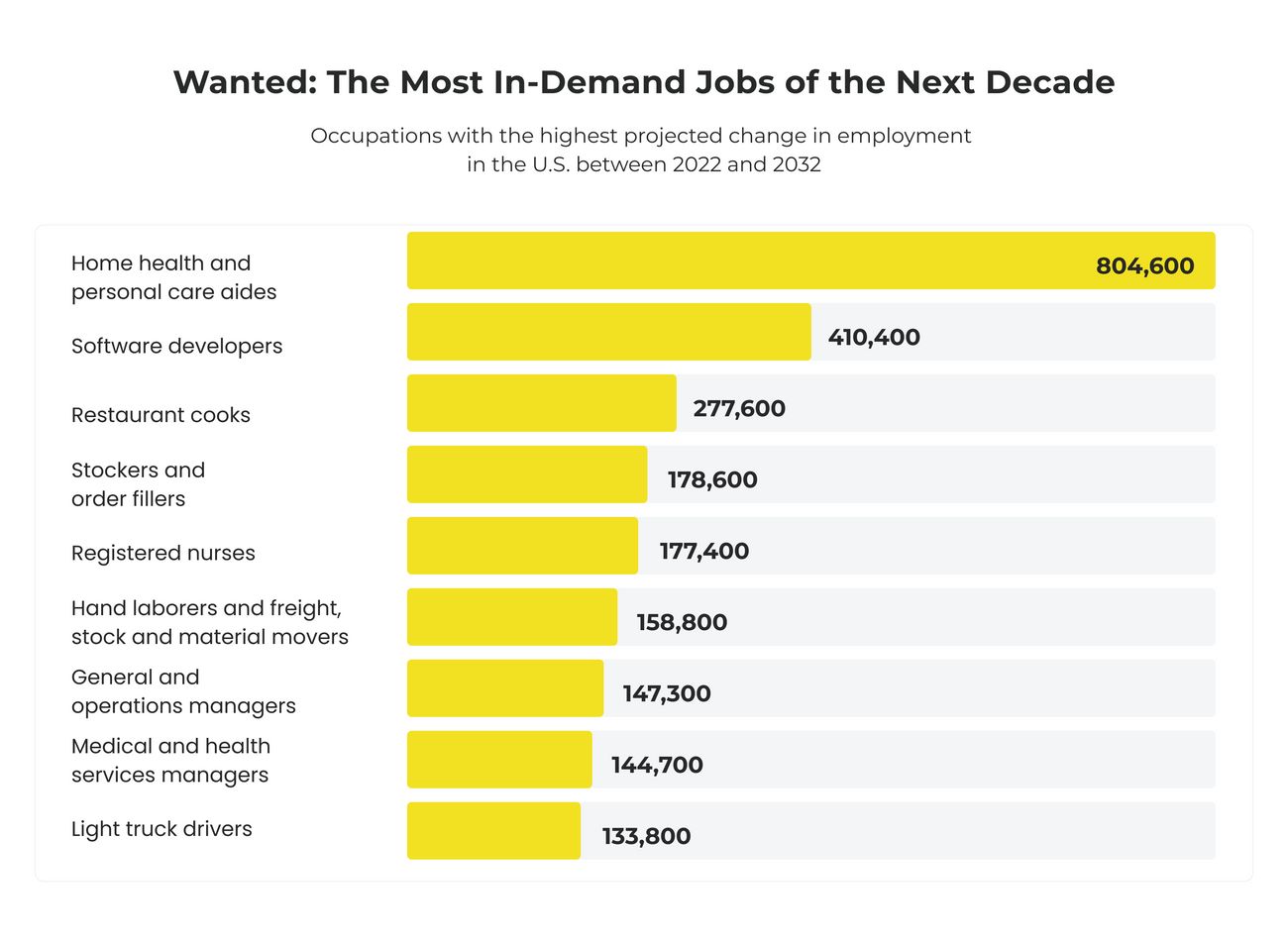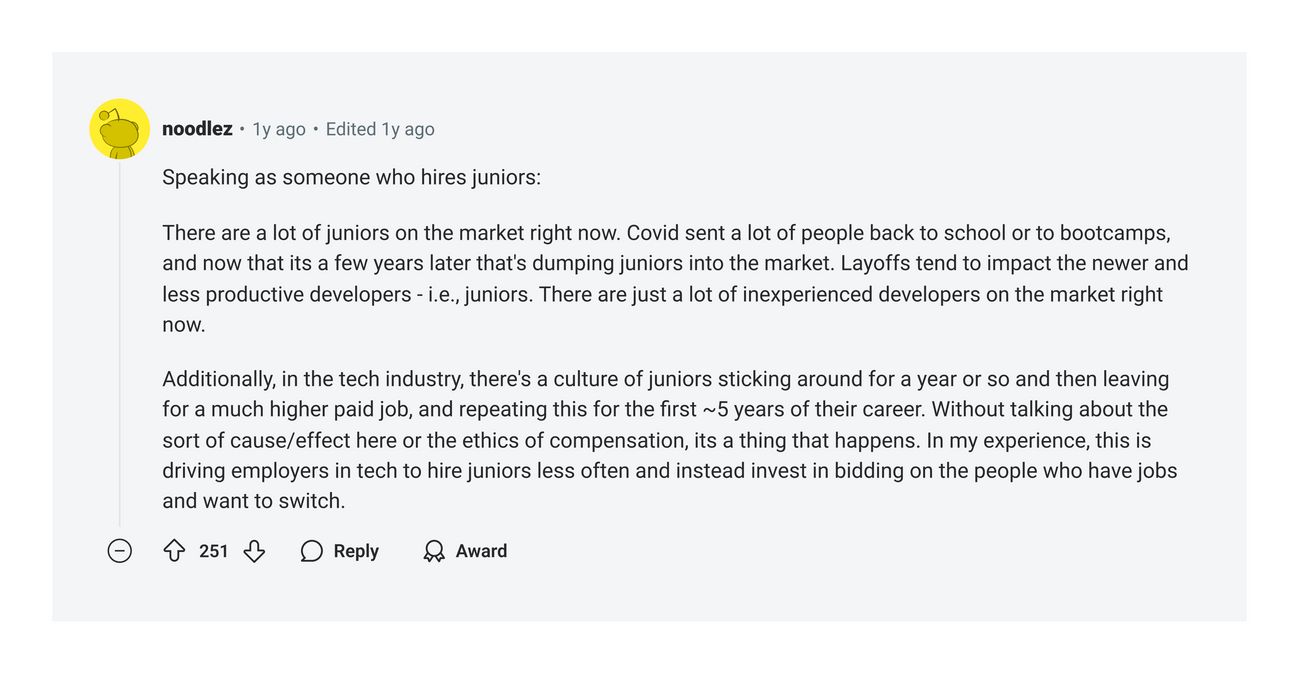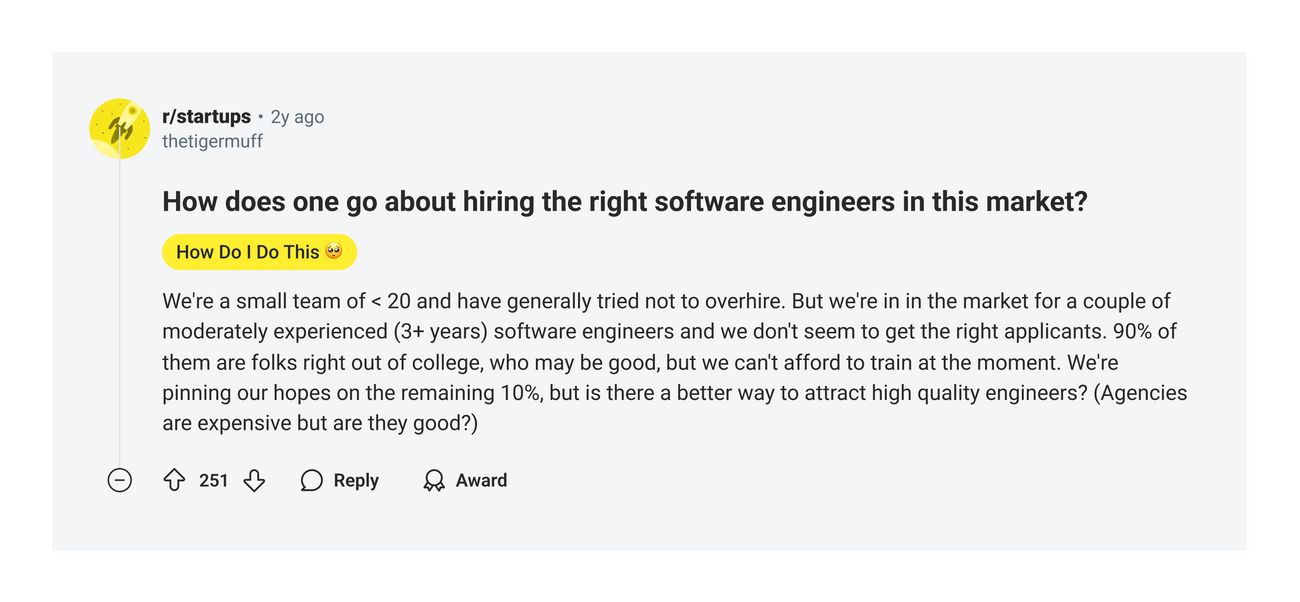Remember when in 2023 tech workers were joking about changing their LinkedIn profiles to something like “former Googler, aspiring barista”? According to Statista, more than 260,000 tech employees were laid off in 2023, with 167,000 of them in the first quarter alone.

Although layoffs continued into early 2024, the hiring scene isn’t looking too shabby now. According to the U.S. Bureau of Labor Statistics, software engineers are not just in high demand. They’re going to remain so for the next decade. It makes the hunt for top software engineering talent a real battlefield. And with high demand comes a high price tag. Companies are ready to pay premium rates to get the best software engineers.

So, how should you approach hiring software engineers to win the right talent in today’s market?
You can go two ways – kick off with senior devs or hire less expensive junior software engineers. But cheaper doesn’t always mean better, especially regarding software development projects.
In this article, we will explore different approaches to hiring software engineers, highlighting their pros and cons. We’ll also share our own experience of building balanced software engineering teams to match our clients’ project requirements and stay within budget.
Junior vs senior software engineers vs both: Which way to go?
When assembling a software engineering team from the ground up, every company faces the classic cost vs. quality dilemma. Should you hire junior software developers to save expenses, or go big with senior experts right from the start? Both options have their benefits, but how does each of them hold up over time? Let’s take a closer look at each approach and see which one pays off in the long run.
Are junior software engineers really cheaper?
At first glance, hiring more junior software engineers instead of seniors sounds pretty tempting. You get more hands on deck and pay less. After all, every senior software developer started as a junior, right? Plus, there are dozens of eager beginners ready to dive in and immediately get down to work.
But here comes the reality check. It’s not all that simple. Junior software engineers might have lower salary expectations, but they need constant supervision, mentorship, and training. All that babysitting can add up fast. Before you know it, you might be spending more than you would on a senior software developer. Plus, in case juniors screw up, someone would have to redo their work. The outcome? You end up bringing in a reliable senior software engineer to clean up the mess.
Another problem with junior software engineers is that they might not stay with you forever. You’ll often see people in forums saying things like, “I don’t want juniors because they tend to jump ship for better pay in just a year.” And honestly, it makes sense – no one wants to put time and money into training someone who just came to add a line in the CV.

So all things considered, the idea of hiring a junior software engineer to save money seems smart, but it can backfire with hidden costs and extra headaches.
Now, let’s assess the perspectives when considering senior software engineers for hire.
Senior software engineers: Can you afford their expertise?
Everyone wants to hire a software engineer with years of experience because they provide real value. They’ve got technical skills, work independently, and don’t need constant hand-holding. But we all know they aren’t cheap. Experienced software engineers demand top dollar, fancy benefits, and, let’s not forget, there’s always a crowd trying to snatch them up. So we are not talking about simply paying more and getting senior software engineers, but also about fighting off other companies for their attention. If you want the best software engineering talent, be prepared to fork out some money.
While it’s totally fine for companies to look for software engineers with solid expertise, sometimes the job listings you see are just ridiculous. Like this one.
A junior software developer with a 10-year experience, seriously?

Of course, it’s not a real software engineer hiring strategy, but such kinds of jobs pop up online. Some companies are hunting for the unicorn “perfect hire”, expecting a “junior” software engineer who’s been in the game for a decade. They want someone with years of experience, top-notch skills, and the willingness to work for entry-level pay. Come on, if someone has 10 years of software engineering experience, they’re not going to settle for that kind of pay.
Jokes aside, what should you do if you don’t have the budget to compete for seasoned professionals and can’t risk hiring juniors?
There is a solution – you can combine the two. Let’s see how it works.
Senior lead, junior team: Is it a winning strategy?
While browsing Reddit for trends in software engineering hiring, we came across a thread where a company was in a tough spot. They needed experienced software engineers but 1) they had no budget to train juniors and 2) they couldn’t compete for top software engineering talent in the market.

So, what’s the game plan? Mixing junior and senior developers can be a smart move during software engineer hire in small companies like this one. The strong team lead manages the newbies, assigning tasks based on their skill level, while the senior software developer handles the more complex work. This way, everyone’s strengths are utilized, and the software engineer team functions efficiently. But that’s not the only benefit of the mentorship approach, so let’s take a look at some other ones.
Cost-efficiency
It’s probably the most obvious advantage since you don’t need to hire a software development team of costly specialists to keep the quality high. Instead, you find juniors who save money and a senior software developer who ensures the work is done right the first time. For example, a senior can quickly spot and fix any issues in the code written by a junior, avoiding expensive rework and delays.
Balanced workload and task allocation
With a mentorship approach, the senior software engineer takes charge of task assignments based on complexity. They tackle the tough stuff, like designing the system architecture or troubleshooting complex bugs, while juniors handle simpler tasks, such as coding basic features or fixing minor issues. Balancing the workload this way gives rookies a chance to improve.
Ongoing mentorship
A big plus is the mentorship juniors get from the senior developer. When stuck on tricky code, they can turn to the senior software engineer for help, who not only helps solve the problem but also explains the solution. This hands-on training rapidly boosts the juniors’ skills and productivity, turning them into valuable team members much faster than they would on their own.
Sustainable talent pipeline
As junior software engineers gain experience and learn from the senior developer, they gradually take on more responsibility and grow into valuable mid-level engineers. Over time, they become key players in the team, bringing fresh perspectives and skills. It reduces the need for constant external hiring, while you get a software engineering team that understands the company culture, processes, and goals.
Innovative team dynamics
When you mix the creative approaches of junior software engineers with the senior’s experience, it really sparks innovation. The juniors bring new ideas, while the seniors can shape those ideas into something solid. It creates a dynamic where everyone is learning from each other and pushing the software development team forward.
With all its benefits, it has to be said that the mentorship approach isn’t a “one-size-fits-all” solution. It’s a great option to consider, but remember what we said about problems related to hiring junior and senior software engineers? Those issues didn’t go anywhere and someone has to tackle them, finding the perfect talent fit.
At KPS, we know every client is unique. We tailor our hiring campaigns to each client’s specific goals, resources, and project requirements. We don’t just stick to a formula, we make it work for you.
So, let’s take a closer look at how we build software engineering teams for companies with different goals and objectives.
How we hire a software engineer team: Experience that works
When clients first come to us, they usually say, “We need only senior software engineers because they know their stuff.” But at KPS, we look beyond the title written in the CV. We evaluate software engineer technical skills and see if they can handle the project tasks.
“In our experience, about 80% of people that call them seniors, turn out to be middle or even junior developers. So, we don’t rely much on titles in the CV – senior or junior, we just focus on finding the right talent.”
Klim Trakht, CTO at Kultprosvet
Clients who have been with KPS for a while don’t insist on a specific seniority level. They just give us their project requirements, and we find the right people to fit their needs and budget. Simple as that. Why hire pricey seniors when a middle or even junior software developer can do the job? Sure thing, much depends on the project’s complexity, budget constraints, and the project stage – whether you’re starting from scratch or looking to scale an existing software development team.
But let’s see how we handle hiring software developers for different clients.
How we built a software engineering team for a unicorn startup, saving around $260,000 annually
At Kultprosvet, we don’t recommend starting with acquiring freelance software engineers or junior software engineers when establishing a team from the ground up. Instead, we suggest bringing in a senior or mid-level software engineer to lead the way, and then adding a few juniors to keep the balance between cost and quality. In this case, we thoroughly vet each senior software engineer to make sure they are not an “impostor-senior”. We don’t just throw the client all the CVs containing the word “senior” and call it a day.
One of the success stories we’re proud of is Liquidity Capital, an AI-driven platform to streamline the funding process. They came to us as a startup with an idea to transform the way fast-growing technology companies access capital.
It all started with a landing page they needed to attract the investment. In parallel, they wanted to start building a platform itself, so we advised hiring a middle software engineer from our core team on a fixed-price model. As the project evolved, we added one more software engineer to work on the platform.
The project quickly gained traction and required more features, so we suggested switching to a dedicated team model. This was a more cost-effective approach, allowing Liquidity Capital to engage more software engineers for the same budget and speed up the project.
Since then, they have grown into a unicorn, raising around $120 million in funding. Today, Liquidity Capital is a global player in AI-driven asset management, with financial hubs in Tel Aviv, New York, Abu Dhabi, Singapore, and London. They have software engineering teams across the world including developers from Ukraine whom we helped them to hire. Partnering with Kultprosvet, Liquidity Capital managed to scale up quickly while saving about 46.9% in hiring costs.
Helping a successful startup cut around $367,800 in annual hiring costs
If a client has a software engineering team and just needs to add more talent, we rarely recommend hiring seniors. It’s not the most cost-effective move, especially when there are already experienced developers who can manage juniors. In such cases, we suggest middle devs or even juniors as the core idea is to find a software engineer capable of handling the project tasks efficiently.
That’s what we did for Pic-Time, an all-in-one solution for managing online galleries, print sales, and marketing automation. They came to us with a working product and an existing software engineer team, but as their user base rapidly grew, they needed to scale their front-end department. However, hiring remote software engineers locally in the USA or Israel was out of their budget.
KPS started by bringing on a single front-end software engineer full-time, but it quickly became clear that they needed more hands. So, we switched to a dedicated team model, which allowed them to grow fast and cost-effectively. We’ve already helped them hire more than 10 software engineer specialists, each carefully selected to meet Pic-Time’s specific needs.
With Kultprosvet, Pic-Time was able to reduce the hiring costs by 33.9% compared to building a similar software engineering team in Israel.
From our experience, you shouldn’t overlook junior software engineers but they aren’t suited for every project either. What really matters are the right skills, not just impressive CVs. A talented junior, when given the opportunity and proper mentorship, can grow into a top senior developer and bring real value to your project. At Kultprosvet, we focus on spotting and nurturing this talent, helping you find software engineer who fits your needs and drives your project’s success.
Hiring software engineers is tough. Let the pros handle it
Be it junior or senior software engineers, the hiring process is a pain. It’s time-consuming, exhausting, and eats up the resources you need for other critical tasks. So, why not leave this job to professionals like KPS? We will help you build a dedicated software development team where each developer is efficient in what they do. KPS will take care of software engineer hiring while you can focus on the bigger picture.
Got more questions on how to hire software engineer with KPS?
I need a software engineer for hire. What should I start with?
There are plenty software engineers for hire. How do I get the right talent within budget?

